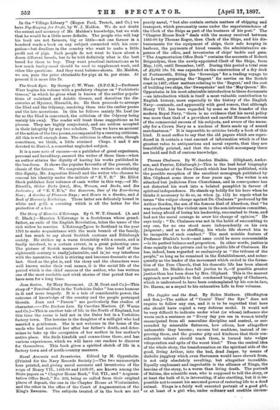Thomas Chalmers. By W. Garden Blaikie. (Oliphant, Ander- son, and
Ferrier, Edinburgh.)—This is the best brief biography of the founder of the Free Church which has been published, with the possible exception of the excellent monograph published by Mrs. Oliphant some three or four years ago. The writer is am attached but judicious Free Churchman, and in consequence has not distorted his work into a belated pamphlet in favour of spiritual independence. He stands up boldly for his hero when he thinks it necessary to do so, as when (p. 115) he repels what he terms "the vulgar charge against Dr. Chalmers" preferred by Sir Arthur Gordon, the son of the famous Earl of Aberdeen, that "he was overborne by the violent men in the non-intrusion committee, and being afraid of losing his leadership, succumbed to them, and had not the moral courage to avow his change of opinion." He says truly : " Dr. Chalmers was not in the habit of succumbing to any one, for no one stood more independently on his own judgment ; and as to shuffling, his whole life showed him to be incapable of such conduct." The most notable feature of Professor Blaikie's book—and none could be more commendable —is its perfect balance and proportion. In other words, justice is done equally to the private and to the public life of Chalmers. He has, indeed, been regarded so exclusively as "the tribune of the people," so long as he remained in the Establishment, and subse- quently as the leader of the movement which ended in the forma- tion of the Free Church, that his domestic life has been almost ignored. Dr. Blaikie does full justice to it,—if possible greater justice than has been done by Mrs. Oliphant. This is the nearest approach now possible to that condensed biography of Chalmers, which is understood to have been contemplated by his son-in-law, Dr. Hanna, as a sequel to his exhaustive Life in four volumes.


































 Previous page
Previous page